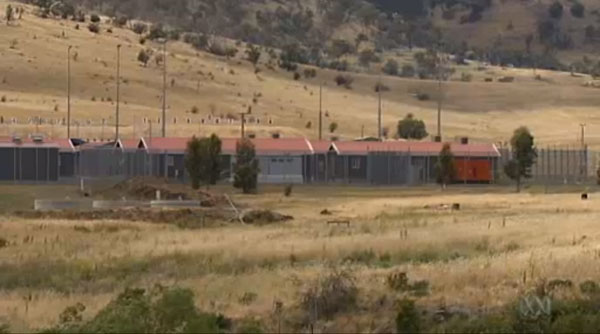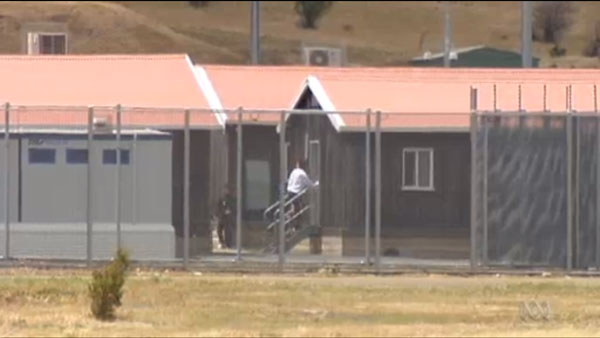It was an ugly face that stared back at Tasmanians in the media mirror, shortly after the new detention centre at Pontville had been announced in 2010.
Although the centre was a ‘fait accompli’ from the Rudd Government’s perspective, a public meeting was held in Pontville for the locals to vent their spleen.
They didn’t hold back.
The vitriol and fear-mongering was running high; concerns about asylum seekers being arsonists, paedophiles, and Muslim extremists with ‘an agenda to take over’ were raised. Voices appealing for compassion were, in some cases, booed down.
Many people I met in the following weeks expressed their disquiet. Were we, as Tasmanians, really so fearful; so angry; so close-minded?
When I held my first meeting for Tasmanian Asylum Seeker Support later that same week, the response spoke for itself: over 150 people packed out the tiny hall, and I was interviewed by journalists from print, radio, and all the nightly news channels.
Tasmanians living overseas emailed me to say that what we were doing no longer made them feel ashamed to be Tasmanian.
Our list of supporters grew into the hundreds, and I stayed up late every night answering enthusiastic emails and offers of help.
Hobart is a small community, and we take what happens here personally. We are as proud of the Museum of Old and New Art (MONA) as if we’d made it ourselves; we all feel indignant when our island gets dropped off the Australian map.
So right from the start, there was a strong sense of commitment to this detention centre: to showing the people inside it that we cared about them, and the people who ran it that we were not going to turn a blind eye.
The Pontville Detention Centre had higher rates of community engagement, and a higher ratio of detainees participating in recreational programs, than any other detention centre in the country.
However, I hesitate to call Pontville a ‘success story’. It was a detention centre: the uncertainty, trauma, and injustice dished out to detainees every day wore them down to the point of suicide attempts and hunger strikes.
Sometimes it felt like our visiting programs, and friendships, and workshops, were just a velvet glove on an iron fist.
But then we would get an email from a torture and trauma counsellor, telling us that a client had confided that his weekly visit from one of our volunteers was the only thing that kept him alive from week to week, and we knew we had to continue.

The iron fist of what the Immigration Department is prepared to do to ‘deter’ asylum seekers from reaching our shores has grown ever tighter since the Pontville Detention Centre was first opened.
The centre now stands empty, its loops of razor wire guarding nothing, its security camera eyes observing frosty grass and the sound of distant cars on the highway.
I wouldn’t wish anyone to live in there, and yet, if the only alternatives are Manus, Nauru, or an Indonesian jail, then perhaps I would.
The further we are away from being able to make a meaningful human connection with asylum seekers, the worse it is for their futures and our nation as a whole.
As the saying goes, ‘it’s impossible for you to hate someone once you know their story.’
The ones who could tell us their story now, who could teach us about what it is to be persecuted or why someone would risk their life in a bid for safety, have been deliberately removed and silenced.
Tasmanian Asylum Seeker Support continues to focus on local, practical actions that humanise asylum seekers and connect them to our community.
In the last two weeks, we have furnished three new rental homes, with donations, that would otherwise have been bare for an asylum seeker family moving in at the start of a Tasmanian winter.
Their cupboards are now stocked with home-made cookies and a framed ‘Welcome Home’ sign sits on one family’s kitchen bench.
It is decorated with Star Wars Lego stickers after a Tasmanian eight-year-old boy heard that the six-year-old Sri Lankan boy who was moving in also loved Star Wars and Lego.
Isn’t that enough reason to connect with someone?
Tasmania, more than anywhere else in Australia, is a place that functions on the basis of its connections and its inter-dependence.
Now that Pontville Detention Centre stands empty, it is not only empty of people. It is empty of the stories that brought them here and empty of the opportunity to know and appreciate each other.
If we are to change the national conversation on asylum seekers, facts alone won’t swing it. It doesn’t do any good to tell people that Australia is flouting the 1951 Refugee Convention; nor does it do any good to tell people that they’re being callous or racist.
Most people in Australia are heartily sick of this issue being shouted at them from atop the soap-boxes of various political persuasions, and probably feel some degree of relief now that the boats have been ‘stopped’ and the asylum seekers who remain are being steadily drained out – and starved out – by the Department of Immigration.

It’s not comfortable to examine our culpability in this issue, and beating people over the head with the issue only makes them more defensive.
There’s only five words that I’ve heard spoken so many times in Tasmania, that I’m convinced can slowly shift the debate: “Come and meet my friend.”
For information about Refugee Week (15 to 21 June) visit www.refugeeweek.org.au
* Emily Conolan is a teacher and Refugee Week Ambassador. In April 2011, on hearing Pontville would be used as a detention centre for asylum seekers, Emily founded the Tasmanian Asylum Seeker Support (TASS) which mobilised hundreds of volunteers in support of asylum seekers. TASS has been commended in a number of awards including Tasmanian of the Year (jointly awarded with TASS volunteers) and the Tasmanian Human Rights Award. Its activities featured in the acclaimed documentary film “Mary Meets Mohammad”.
Donate To New Matilda
New Matilda is a small, independent media outlet. We survive through reader contributions, and never losing a lawsuit. If you got something from this article, giving something back helps us to continue speaking truth to power. Every little bit counts.



